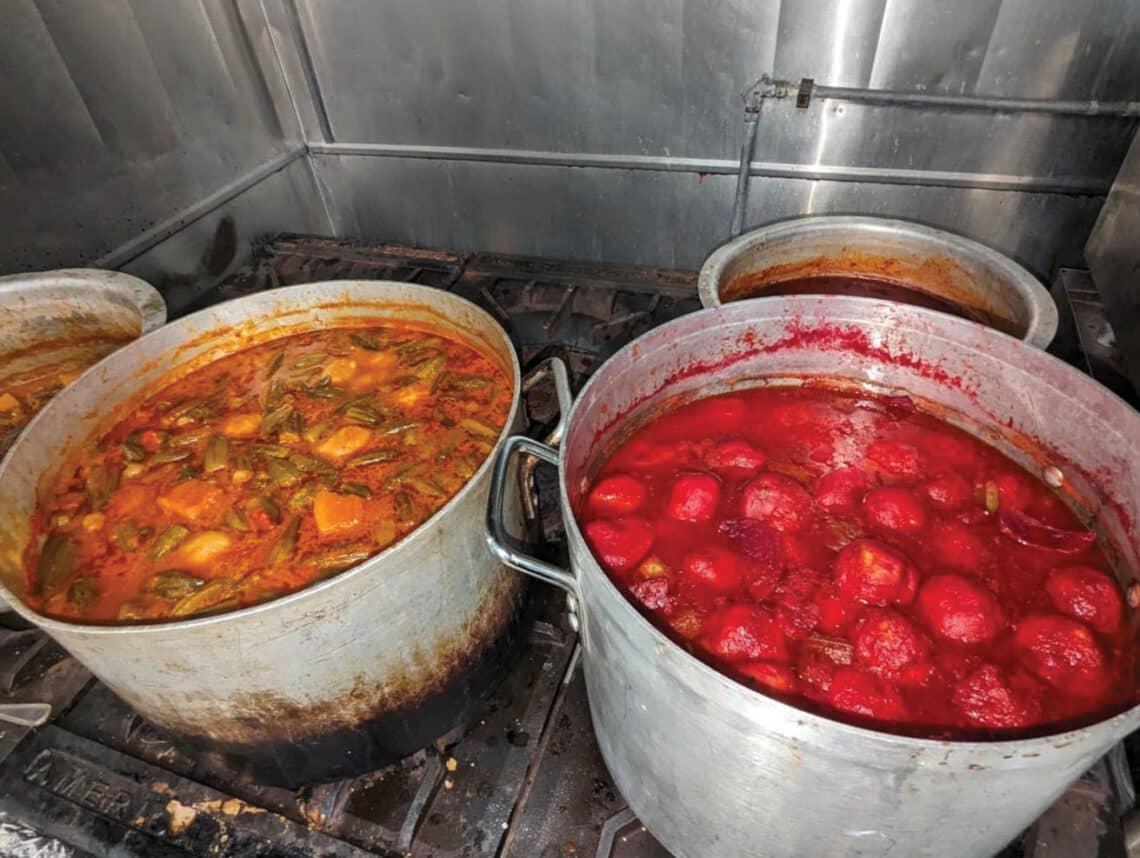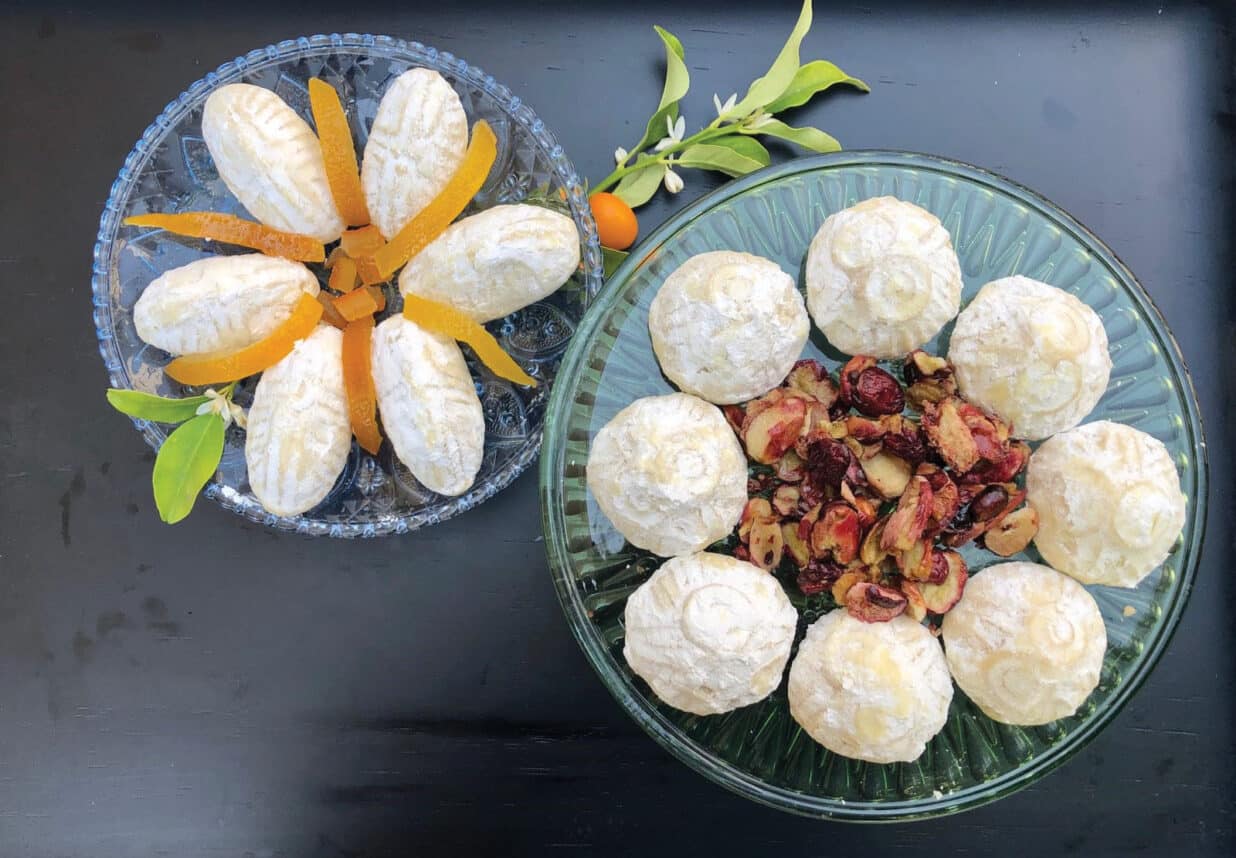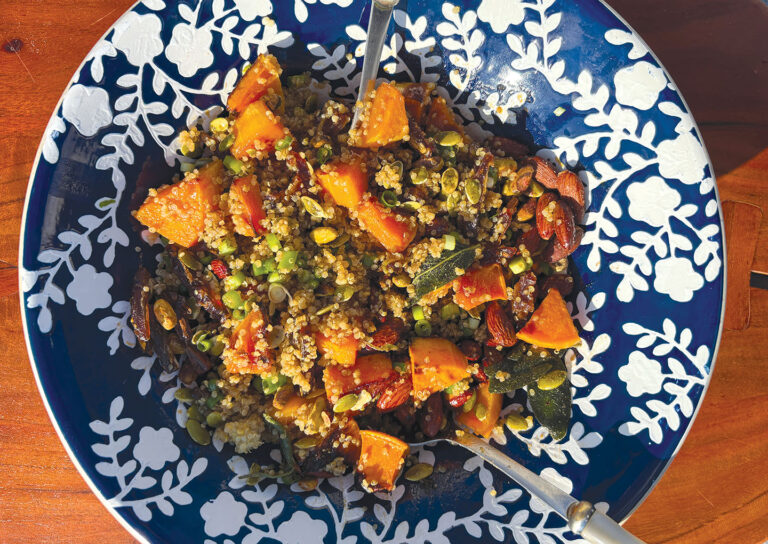Food is Love: A Recipe for a Vegan Bamia Stew…and Ma’amul Cookies
Often times, we cook because we have to feed our family and friends. But sometimes our cooking has a deeper purpose.

My father’s upbringing in Baghdad, Iraq didn’t include pop psychology. In fact, there was very little that was Western about his early life. It always amused me when he would make references about his childhood and talk about Western things like calling bread “loaf” and how he smoked a Marlboro cigarette once (hated it and never picked up another) and the first time he saw a movie and was so impressed by the dramatic music and loud announcement “20th Century Fox” in Arabic.
My father’s upbringing included discipline, utter and immense respect for his parents and a strong sense of responsibility for family. He never told me that he loved his parents, but I knew it from the stories he told about them. I never heard him tell my mother “I love you!” But it was obvious in the way he behaved, in gestures big and small. He never said “I love you” to me, but I knew it in the core of my being.
I have a confession to make. I have a Starbucks addiction — every single day, I go there for a flat white. I know, I know, there are better coffees out there, but I really love their water (once I overheard a manager explaining to a potential barrista that the water goes through reverse osmosis 18 times). Also, they have a Rewards program. Let’s just say I have a lot of stars!
My father also loved coffee. During his long stays in the hospital, my favorite thing to do was to bring him a Starbucks latte. And every day (mostly nights) that I left the hospital, I would kiss my father on the forehead and say “Ani ohevet ot’cha!” (I love you in Hebrew.)
My father’s funeral in Beit Shemesh, Israel was a surreal experience. (I must thank Rabbi Kalman Topp of Beth Jacob Congregation, Israeli Consul-General Hillel Newman and my husband Alan for spending hours on the phone to ensure that my father’s body was on the Monday morning El Al flight.)
His funeral was preceded by that of Cantor Moshe Kraus, a 100 year old Holocaust survivor. Kraus sang every Sunday for Commandant Josef Kramer, the “beast of Belsen,” who kept him alive because of his beautiful voice. Many survivors of Bergen-Belsen remember that Moshele’s trove of Yiddish and sacred music kept their hope and faith alive in that dark, hellish place. After the war, he became the first official Hazan of Tzahal, the Israeli Defence Force. And although he lived in Ottawa and passed away childless, his funeral was standing room only.
It was so bittersweet to be reunited with my father’s much loved sisters Daisy and Adina and younger brother Naim, his partner in youthful adventures and Aliyah to Israel. It was heartwarming to see so many of my fathers nieces and nephews, my mother’s cousins and so many friends make the effort to mourn with us on a very hot Tuesday afternoon.
We sat Shiva in Rehavia. The apartment had a huge balcony surrounded by sentry palm trees, tall eucalyptus and flowering plants, with views of the Russian Compound and the white dome of the YMCA. My cousin Sarah Sassoon, poet and children’s book author, brought us a pot of lentil soup (traditional mourners food) and a large tray of the most delicious chicken and simple white rice.
The apartment was on the third floor and the front door was always left wide open. But it was still a surprise when a man just walked in, bearing two huge boxes of hot burekas and greeted us with the traditional “HaMakom Yanachem Otchem.” (The Place Will Comfort You.) Just a regular Israeli delivery guy. I actually cried when I opened the card and saw the loving message from Beth Jacob.
Sephardim have the minhag to serve an array of foods at Shiva so that visitors make a bracha for the neshama (soul) to have an Aliyah in Heaven. Fortunately, the food in Israel, especially in the summer, is ridiculously good. Juicy watermelon, dark ripe cherries, sweet fleshy peaches. Fresh, chewy multi-grain bread with flavorful yellow cheeses. And the best “pitzuchim”—pumpkin seeds, nuts, dried fruit and even Japanese rice crackers. Every day, I would send my son Ariel and my nephew Yosef Yitzchak to Shuk Mach’ne Yehuda with a long list of food to buy.
Our dear family friend Lillian sent us a beautiful fruit platter. My good friend Shirley organized a long list of friends who contributed to an appetizer tray filled with Syrian kibbe (made with bulgur and ground beef), lach’majin (mini Syrian ground beef pizzas), kubbah and fried chicken poppers. My mother’s cousin Ilana brought homemade ka’akat, a crispy, salty ring cracker that is traditionally served at Iraqi mourning homes.
Many visitors brought cakes and cookies. There were a lot of long, narrow chocolate babkas (called crunch in Israel).
-Sharon
When Sharon came back from Israel, she told me that she wanted to make Kubbah Bamia and Kubbah Shwandar for her father’s Shloshim. Kubbah is the catch all name for a shell casing around a meat ball made from ground beef or lamb or chicken breast, sometimes made with bulgur or potato or rice. But Sharon was talking about making Kubbah with semolina. It’s very fiddly and not that easy to make.
On the appointed day, I walked in to Kahal Joseph to see Sharon and our good friends Esther and Jazmin and Kahal’s resident chef Penina sitting in front of industrial size bowls of semolina dough and ground beef mixed with Italian parsley, finely chopped onion and spices.
I sat down, overwhelmed by the task at hand. I thought for sure we would be there until midnight. But I forgot who I was dealing with, these ladies are serious in the kitchen. Before we knew it, we had produced 360 Kubbah, which Penina promptly froze. Sharon even repurposed the leftover meat filling into large trays of kebab by adding eggs, potato starch and more spices.
In the time it took to wash our hands, Esther had already made an industrial size bowl of ma’amul dough (made with flour and semolina and lightly scented with orange blossom water) and another bowl with a date paste filling and one with a crushed nut filling. We started an industrial line. Esther rolled the dough into balls for us. Jazmin filled hers with the dates and I filled mine with the nuts and we pressed each ball into the beautiful wooden molds and banged out 200 cookies. The smell of the cookies baking in the oven was heavenly. Meanwhile, Sharon and Penina were rolling date and nuts balls into coconut (one of her father’s favorite treats).
I took a deep breath and looked at my dear, devoted friends cooking together. I thought to myself “Wow, this is how it must have been back in the day, with family and neighbors gathering to cook and bake together.”
Esther was prepared to keep going but we all protested. We all went home for some well-deserved rest. I thought about what we had accomplished — we had made these complicated, traditional recipes with such ease and camaraderie. We even had some laughs.

On the morning of the memorial for Sharon’s father, I walked into the kitchen at Kahal Joseph. Sharon and her daughter Alexandra had four huge pots of stew boiling on the fire. There were two pots of vibrant reddish purple beet stew and two pots of deep tomato-red okra and butternut squash stew. It was a magical sight to see Sharon and Alexandra drop all the Kubbah we had made into the two larger pots. (To accommodate the vegetarian guests, Sharon kept the smaller pots of each stew vegan.)
Sharon and I set up a long buffet table. In the middle, there was a decorative bicycle filled with bright flowers (symbolic of the bicycle Sharon’s father rode well into his 80’s). There was fried fish and baked chicken, white rice and Persian dill rice and lots of salad. But the Kubbah was a major hit with Ashkenazi and Sephardi alike. Everyone thanked us for this special meal. Quite a few people told us that the Kubbah took them back to their grandmothers’ kitchen.
The dessert table was filled with fresh fruit and dates and dried fruits and nuts and Alexandra’s freshly baked brownies. Our flower shaped Ma’amul cookies were amazing. The crispy dough was lightly dusted with powdered sugar and had just the right crunch and perfect orange blossom perfume. The dates inside were melted smooth and delicious. They disappeared in minutes.
Often times, we cook because we have to feed our family and friends. But sometimes our cooking has a deeper purpose. Our purpose was to honor the memory of Sharon’s father by preparing his favorite Iraqi foods. I am so very proud of my dear Spice Girl Sharon for carrying on the legacy and traditions of her grandmothers.
I truly know the blessing comes from our hands and is transmitted into the food we make. When you are cooking with intention and love in your heart, you achieve perfection. The food bursts with flavor and texture and you can taste the love.
I truly know the blessing comes from our hands and is transmitted into the food we make. When you are cooking with intention and love in your heart, you achieve perfection. The food bursts with flavor and texture and you can taste the love.
What a special evening to honor the neshama of David Ben Rafael and Rosa.
You could feel the love in the room.
—Rachel
Okra and Butternut Stew
1/4 cup extra virgin olive oil
1 large onion, finely diced
1 tsp turmeric
1 tsp sweet red paprika
1 tsp garlic powder
1/2 tsp finely ground black pepper
1 tsp salt
Six cloves garlic finely chopped
2 large tomatoes, finely chopped
1 28oz can of crushed tomatoes
2 Tbsp tomato paste
2 Tbsp sugar
Two large lemons juiced
4 cups of water
2 Tbsp consommé powder
1 medium butternut squash, peeled, seeded and cut into 2 inch dice
1 400g bag frozen okra
In a large pot, warm oil over medium heat. Add onions and sauté until translucent. Add turmeric, paprika, garlic powder, pepper and salt and stir well.
Add the garlic and sauté for two minutes.
Add the tomatoes, the crushed tomatoes and the tomato paste. Stir well and bring to a boil.
Add the sugar, lemon juice and water. Stir well.
Add the consommé powder and the butternut squash and stir well. Cover the pot and lower the heat. Allow to simmer for 20 minutes.
Add okra and simmer for another 10 minutes.
Serve hot with white rice.
Esther’s Ma’amul Recipe

Dough
2 cups all purpose flour
1 cup semolina flour
1/2 tsp rose water
1 cup unsalted butter or margarine or coconut oil
Nut Filling
1 pound walnuts, ground
2 Tbsp confectioners sugar
1 Tbsp unsalted butter or margarine or coconut oil, melted
1/2 tsp cinnamon
1/2 tsp orange blossom water
Date Filling
1 lb pitted dates
1/2 cup ground walnuts
1/2 tsp cinnamon
1/2 tsp orange blossom water
Preheat oven to 350°F.
Combine flour and semolina in a large bowl until it has a crumb consistency.
Add rose water, fold in the butter and add 1/2 tsp lukewarm water.
Knead the dough well and place in the refrigerator until ready to use.
Prepare the fillings by combining the ingredients.
Divide the dough into four portions.
Work with one portion at a time, while covering the rest as you work.
Pinch walnut size balls of dough, then press down on the center with your finger, to form a ½ inch indentation.
Fill the indentation with ¼ tsp of the filling, then close the pastry.
If using a ma’amoul mold, press the top of the pastry firmly against the mold, then lightly tap the mold on a hard surface to remove the pastry.
Place the pastry on a cookie sheet lined with parchment paper.
Bake 10-12 minutes or until the bottom of the pastries are lightly browned and tops remain pale.
Sprinkle the cookies with confectioners’ sugar before serving.
Sharon Gomperts and Rachel Emquies Sheff have been friends since high school. The Sephardic Spice Girls project has grown from their collaboration on events for the Sephardic Educational Center in Jerusalem. Follow them
on Instagram @sephardicspicegirls and on Facebook at Sephardic Spice SEC Food.







